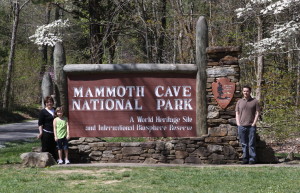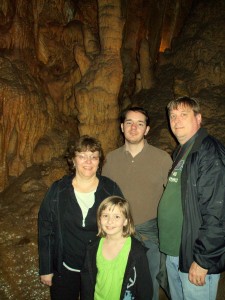Our family loves exploring caves and we’ve visited several on our road trips across the United States throughout the years. There is something exciting about being in the dark underground caves. It is interesting to learn about how these caves are formed on the guided tours and there is always something to see inside, such as stalactites, stalagmites and other rock formations or bats, blind fish or sometimes even mummified animals that are found deep within the caves. A few years ago we planned a trip to see Mammoth Caves National Park in central Kentucky which is one of the longest cave systems in the world.
A brief history of Mammoth Cave National Park
Mammoth Cave National Park was established on July 1, 1941 and covers over 52,000 acres and has over 400 miles of surveyed interconnected cave passageways. The area of Mammoth Cave was formed more than several million years ago when water started to work through the limestone deposits by dissolving the rock and creating underground water passageways that connected with the nearby Green River. Over time the water level slowly worked further underground creating narrow horizontal tunnels, vertical shafts and large caverns that were interconnected. Eventually as the water continued to seep into the cave stalactites, stalagmites and gypsum crystal formations began to form.
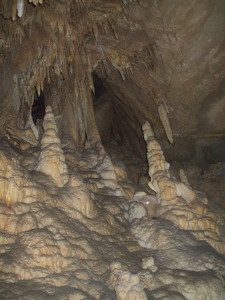
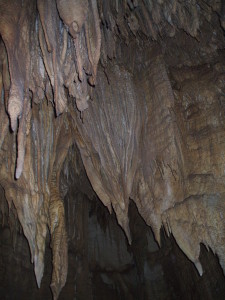
In regards to the human history of Mammoth Caves, it has been determined that Native Americans had been in this area of Kentucky for over six thousand years. Several pre-Columbian Native American remains have been found within the cave and it has been determined that these burial were intentional. But in 1935, the remains of an adult male were discovered that indicate that the person, who became known as “Lost John”, became trapped when a large boulder shifted and fell on top of him. For a period of time his remains were on display to the public but when this became a sensitive and political issue the remains were buried in an undisclosed location with Mammoth Caves.
Mammoth Cave was discovered by one of the Houchin brothers in 1767 while on a pursuing a bear on a hunting trip he found a large cave opening near the Green River. The ownership of the land changed throughout the following years and during the War of 1912 the English blockage created a shortage of saltpeter which was used for the American military gunpowder. As a result, the saltpeter extracted from the cave became a very profitable business.
After the war the price of saltpeter fell dramatically and the mines were eventually abandoned. The cave became a local tourist attraction and tours were given. A slave tour guide was responsible for making many important cave discoveries and was responsible for making a detailed map and naming several of the cave’s features. When the remains of a Native American mummy were discovered in the cave the cave received international attention.
Eventually private citizens formed the Mammoth Cave Park Association in 1926. Donated funds were used to purchase local farms within the area for extremely low prices and unfortunately during the process thousands of people were displaced and relocated to other areas. Once the required minimum acreage was acquired to meet federal requirements, Mammoth Cave National Park was officially established and dedicated on July 1, 1941.
During the 1940s, the CCC was brought to Mammoth Cave to make improvements to cave passageways and build administration park buildings and additional staff housing. Throughout the 1950s to 1970s, the Mammoth Cave National Park grew significantly in size when the other caves in the area were officially surveyed and confirmed as being definitely connected to Mammoth Cave.
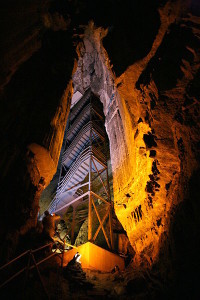
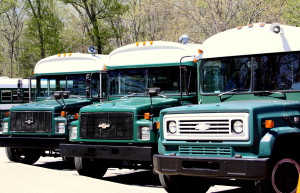
Mammoth Cave National Park visitor information and tips
- Mammoth Cave National Park is located in central Kentucky, about 90 miles southwest of Louisville, and is open year-round, but the best time to visit is spring or fall. Summer months can be very hot and crowded.
- Tours of Mammoth Caves are very popular and do sell out quickly, especially between April and October. Visitors are advised to make reservations in advance and tickets will be held at “Will Call” and must be picked up at least 30 minutes prior to trip departure. For more information on the tours, please see the Mammoth Cave National Park website at www.npsgov/maca.htm
- There are several different tours to choose ranging from easy to very difficult, some last 1½ hours, the 3 hour lantern tour and the wild cave tour which is over 6 hours. The various tours explore different areas of the cave with interesting places such as Mammoth Dome, Bottomless Pit, Fat Man’s Misery, Frozen Niagara, Snowball Room and the Drapery Room.
- There is a tour which is specially designed for children 8-12 years old, the Children Trog Tour. Parents accompany their children for the first part of the program and then the children explore the cave with their guide. Please see the Mammoth Cave National Park website for more information and restrictions, www.nps.gov/maca.htm
- Visitors should wear comfortable shoes with non-skid soles and bring a jacket; the temperature inside the cave can be cool even during the summer.
- SPECIAL TRAVEL NOTICE: Please be aware that a disease called White-Nose Syndrome is a potential threat to the Mammoth Cave bats. The park may restrict what visitors can wear or bring into the cave. Clothing, footwear and other items that have been worn in other caves or mines in specific areas of the country may not be brought into the Mammoth Cave. For more information, please see the Mammoth Cave National Park website at www.nps.gov/maca.htm

